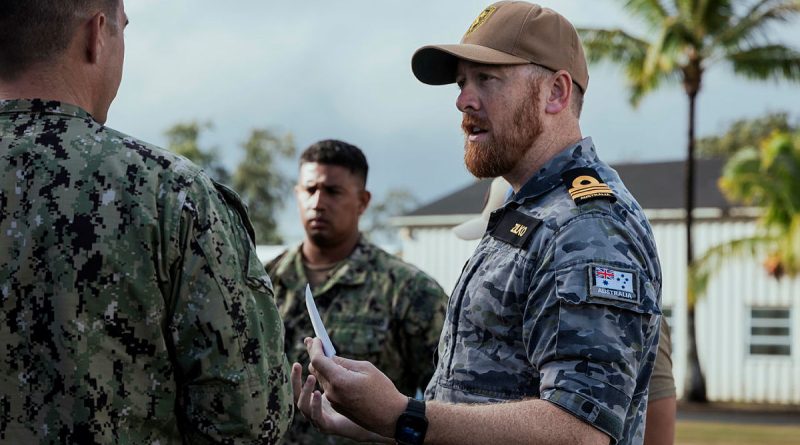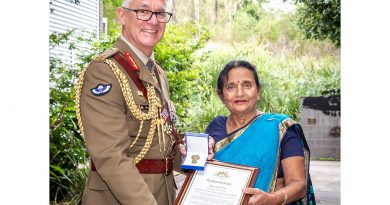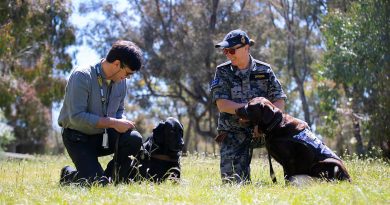Planning for mine warfare training

Royal Australian Navy Mine Warfare Clearance Diving Officer (MCDO) Adam Zilko’s current exchange posting to the United States has involved him leading mine counter measures (MCM) exercise planning at RIMPAC 2024.
CAPTION: Royal Australian Navy mine warfare clearance diving officer Lieutenant Commander Adam Zilko, participates in a brief for mine countermeasures as a part of Exercise Rim of the Pacific (RIMPAC) 24 in Hawaii. Story by Lieutenant Carolyn Martin. Photos by Corporal Nicole Dorrett.
Lieutenant Commander Zilko is posted to the US Command Naval Surface and Mine Warfighting Development Centre (SMWDC) in San Diego on the US west coast, as part of a personnel exchange program.
He divides his time between the SMWDC and Mine Counter Measures Group (MCMGRU) Three at Point Loma.
Lieutenant Commander Zilko is one year into his three year posting to the US. He said planning the MCM component of RIMPAC 24 was a big challenge, especially since it hadn’t been conducted in Hawaii since 2010.
He said historically SMWDC was the US command that planned and executed the mine warfare portion of exercise RIMPAC, until early in 2023 when it was handed over to MCMGRU Three.
“Typically the mine warfare portion of exercise RIMPAC had been conducted in San Diego. This year’s iteration of RIMPAC is the first time since 2010 that mine warfare will be conducted in Hawaii as part of the exercise,” Lieutenant Commander Zilko said.
“Many of the key position holders at US Third Fleet understand the complexities in operating in and around the Hawaiian Islands, and that transitioning mine warfare from Southern California to Hawaii would not be an easy feat to achieve. Integrating mine warfare into the larger RIMPAC scenario, safely conducting mine warfare training with six partner nations, and being good environmental stewards is seen as a win for the command.
“I worked with various planners for the exercise to integrate mine warfare across various task forces including the amphibious forces, Navy Expeditionary Combat Forces, Special Operations and the Anti-Submarine Warfare command.
“I’ve also incorporated recent examples of mine threats seen around the world, and applied these incidents into the mine warfare scenario for the exercise to help energise the mine warfare capability amongst the other warfare specialists. It highlights the importance of mine warfare and the challenges we need to continue to work on as a combined maritime force.”
About 200 operators from five different nations are involved in the mine warfare scenario, including a helicopter squadron from San Diego, a US dive unit, a Belgium unmanned underwater vehicle (UUV) team, German and Netherlands dive teams, and a Japanese hybrid UUV and dive team.
Lieutenant Commander Zilko said the mine warfare commander and their team had to prioritise and deal with three main missions at Exercise RIMPAC 24.
“In the tactical phase of the exercise, the mine warfare commander and their team will encounter three time-sensitive missions that will need to be achieved to enable other maritime task force commanders the ability to commence their missions and achieve the overall mission of the exercise,” he said.
“These missions range from clearing a strait of mine threats to enable safe passage of a carrier strike group; locating and neutralising mine threats to enable amphibious landings; and the search and clearance of debris and mine threats in a harbor to re-open the port for economic trade.”
The teams will further develop tactics, techniques and procedures on how to conduct MCM missions in a semi-permissive environment close to shore, and how to use small, quick-reaction force boats in a minefield.
Lieutenant Commander Zilko looks forward to building on the mine warfare scenarios and training exercises for RIMPAC 2026 before handing over the role to his successor.
He will return to the clearance diving community in Australia following RIMPAC 26 and hopes to take up a commanding officer position.
Lieutenant Commander Zilko said the move to the US had been a big challenge for him and his family and the cultural change was significant.
“The US military system is much larger than ours, so integrating into a US unit and understanding how their military operates has been a big challenge but definitely achievable,” he said.
His family, including wife Susie, and children Charlie, 6, and Olivia, 4, had taken some time but are now settled into life in San Diego.
.
.

.
.





